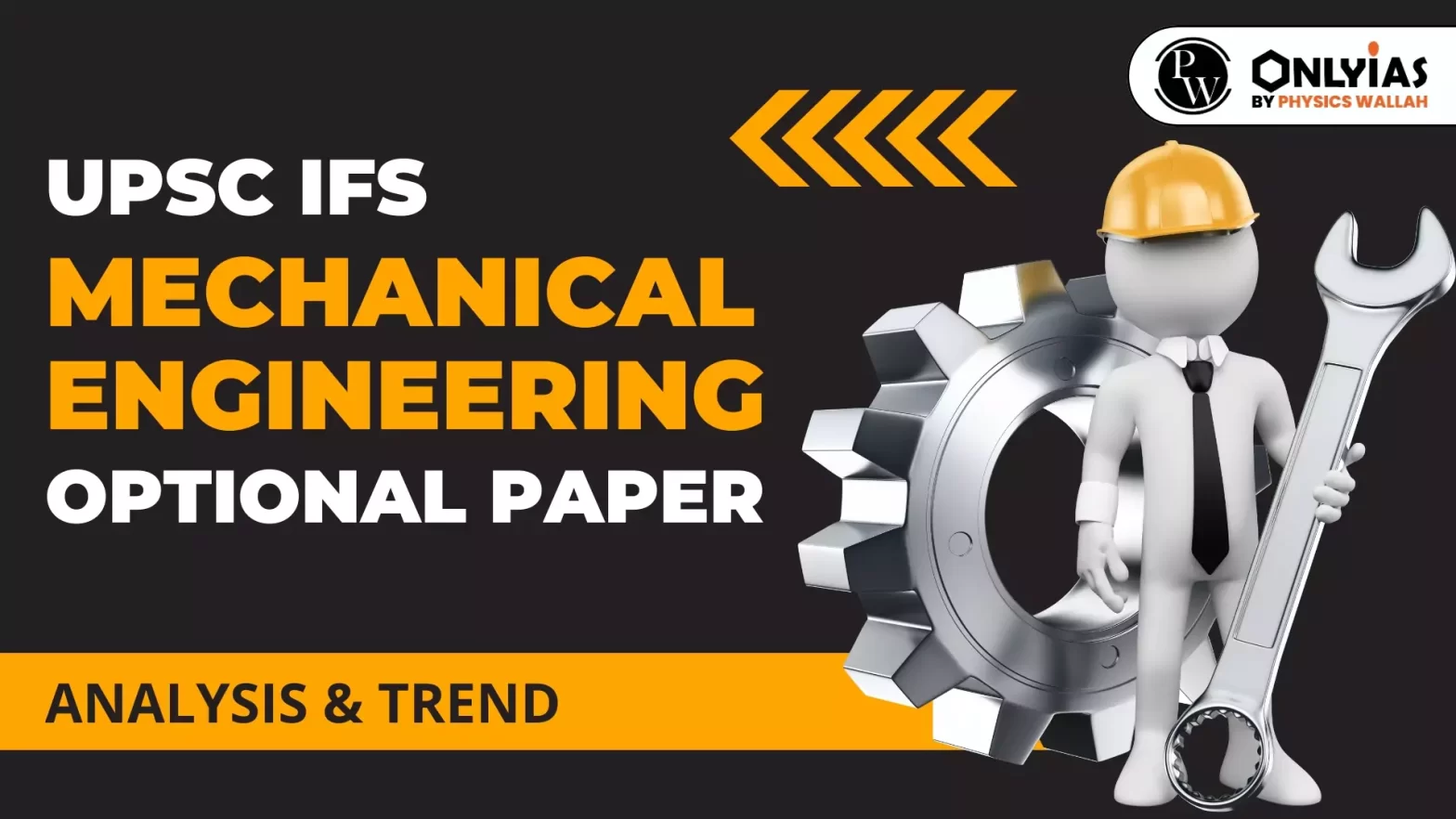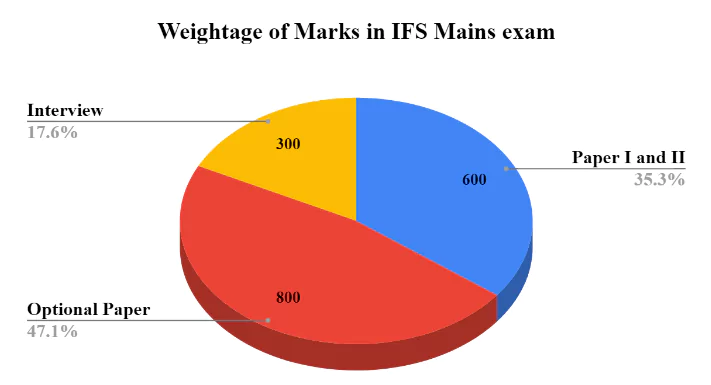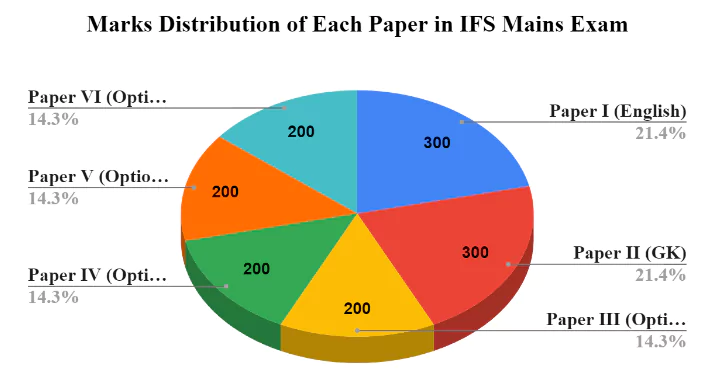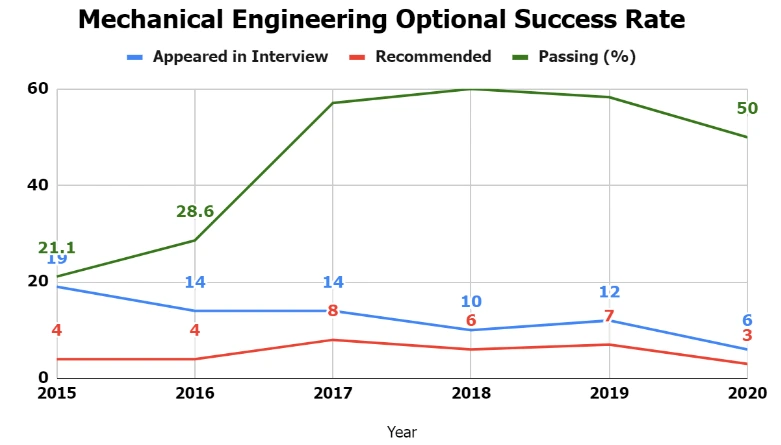Prepare for UPSC IFS Mains with Mechanical Engineering Optional. Explore its weightage, success strategies, past trends, and a comprehensive booklist for success. Download PDFs of 2018-2022 question papers.

The UPSC IFS mains consist of a total of six papers with a total of 1400 marks. The IFS Mains examination includes two papers: one on English and one on General Knowledge. The remaining four papers (Paper I, Paper II, Paper III and Paper IV) cover optional subjects that candidates have chosen during the application form filling process. Since Paper I and Paper II have a maximum of 300 marks each, the remaining 800 marks depend on the optional subjects. It becomes crucial to choose the right optional subject and employ the right strategy so that candidates can score as much as possible. First, we will explore the importance and weightage of optionals, and then we will analyze Mechanical Engineering Optional papers.
| Download IFS 2023 Mechanical Engineering Optional Paper-01 Download IFS 2023 Mechanical Engineering Optional Paper-02 |
In UPSC IFS mains examination candidates have to choose two optional subjects from the list specified in the notification unlike UPSC IAS mains exam in which candidate has to choose only one optional subject. In IFS exam optional subjects have very high scoring potential because after Paper I and Paper II which consist of 600 marks optional have 800 marks so here optional plays a decisive role in determining your selection as well as to achieve a good rank.

It is evident that in the entire selection process, the optional subject plays a crucial role in preparing for the UPSC IFS exam, as it accounts for almost 48% of the total marks. This substantial portion contributes significantly to the overall evaluation of the entire exam.

Upon further magnification, we can conclude that in the IFS mains examination, the optional section carries almost 58% of the total mains marks. Therefore, scoring well in the optional section, along with Paper I and Paper II, will result in higher overall marks in the exam.
In the UPSC IFoS Mains exam, Mechanical Engineering Optional paper consists of two papers, specifically Paper I and Paper II. Each of these papers carries a weightage of 200 marks, summing up to a total of 400 marks for this optional subject. Among the various optional subjects offered by UPSC in IFoS, Mechanical Engineering is one of the 14 optional subjects available to candidates.
| Mechanical Engineering | Syllabus |
| Paper I | Theory of Mechanics-Kinematic and dynamic analysis of planar mechanisms. Cams, Gears and gear trains, Flywheels, Governors, Balancing of rigid rotors, Balancing of single and multicylinder engines, Linear vibration analysis of mechanical systems (single degree and two degrees of freedom), Critical speeds and whirling of shafts, Automatic Controls, Belts and chain drives. Hydrodynamic bearings.
Mechanics of Solids- Stress and strain in two dimensions. Principal stresses and strains, Mohr’s construction, linear elastic materials, isotropy and an isotropy, Stress-strain relations, uniaxial loading, thermal stresses. Beams : Banding moment and shear force diagrams, bending stresses and deflection of beams, Shear stress distribution. Torsion of shafts, helical springs. Combined stresses, Thick and thin walled pressure vessels. Struts and columns, Strain energy concepts and theories of failure. Rotation discs. Shrink fits Engineering Materials- Basic concepts on structure of solids, Crystalline materials, Defects in crystalline materials, Alloys and binary phase diagrams, structure and properties of common engineering materials. Heat treatment of steels. Plastics, Ceramics and composite Materials, common applications of various materials. Manufacturing Science- Marchant’s force analysis, Taylor’s tool life equation, machinability and machining economics, Rigid, small and flexible automation, NC, CNC. Recent machining methods- EDM, ECM and ultrasonics. Application of lasers and plasmas, analysis of forming processes. High energy rate forming. Jigs, fixtures, tools and gauges, Inspection of length, position, profile and surface finish. MANUFACTURING MANAGEMENT- Production Planning and Control, Forecasting-Moving average, exponential smoothing, Operations sheduling; assembly line balancing. Product development. Break Even analysis, Capacity planning. PERT and CPM. Control Operations : Inventory control-ABC analysis. EOQ model. Materials requirement planning. Job design, Job standards, work measurement, Quality management-Quality control. Operations Research- Linear programming-Graphical and Simplex methods. Transportation and assignment models. Single server queuing model. Value Engineering : Value analysis, for cost/value. Total quality management and forecasting techniques. Project management. ELEMENTS OF COMPUTATION : Computer Organisation, Flow charting. Features of Common Computer LanguagesFORTRAN d Base III, Lotus 1-2-3 C and elementary programming |
| Paper II | THERMODYNAMICS- Basic concept. Open and closed systems, Applications of Thermodynamic Laws, Gas equations, Clapeyron equation, Availability, Irreversibility and Tds relations.
I.C. Engines, Fuels and Combustion : 43 Spark Ignition and compression ignition engines, Four stroke engine and Two stroke engines, mechanical, thermal and volumetric efficiency, Heat balance. Combustion process in S.I. and C.I. engines, pre-ignition detonation in S.I. engine Diesel knock in C.I. engine. Choice of engine fuels, Octane and Cetane ratings. Alternate fuels Carburration and Fuel injection, Engine emissions and control. Solid, liquid and gaseous fuels, stoichometric air requirements and excess air factor, fuel gas analysis, higher and lower calorific values and their measurements. HEAT TRANSFER, REFRIGERATION AND AIR CONDITIONING- One and two dimensional heat conduction. Heat transfer from extended surfaces, heat transfer by forced and free convection. Heat exchangers. Fundamentals for diffusive and convective mass transfer, Radiation laws, heat exchange between black and non black surfaces, Network Analysis. Heat pump refrigeration cycles and systems, Condensers, evaporators and expansion devices and controls. Properties and choice of refrigerant, Refrigeration Systems and components, psychometrics, comfort indices, cooling loading calculations, solar refrigeration. TURBO-MACHINES AND POWER PLANTS- Continuity, momentum and Energy Equations. Adiabatic and Isentropic flow, Fanno lines, Raylegh lines. Theory and design of axial flow turbines and compressors, Flow through turbo-machine blade, cascades, centrifugal compressor. Dimensional analysis and modelling. Selection of site for steam, hydro, nuclear and stand-by power plants, selection base and peak load power plants Modern High pressure, High duty boilers, Draft and dust removal equipment, Fuel and cooling water systems, heat balance, station and plant heat rates, operation and maintenance of various power plants, preventive maintenance, economics of power generation. |
UPSC Mechanical Engineering Optional Question Papers from 2018 to 2022 are readily available for aspirants seeking to enhance their preparation. We provided access to the UPSC IFS Mechanical Engineering Optional paper in PDF format, an invaluable resource for your preparation.
| Year | Paper |
| UPSC IFoS Mechanical Engineering Question Paper 2018 | Download Paper I |
| UPSC IFoS Mechanical Engineering Question Paper 2019 | Download Paper I |
| UPSC IFoS Mechanical Engineering Question Paper 2020 | Download Paper I |
| UPSC IFoS Mechanical Engineering Question Paper 2021 | Download Paper I |
| UPSC IFoS Mechanical Engineering Question Paper 2022 | Download Paper I |
Candidates appearing for the UPSC (Union Public Service Commission) IFS examination must make a thoughtful choice when selecting their optional subject, as it holds substantial weightage in the evaluation process. With a total of 800 marks allotted, the optional subject constitutes approximately 48% of the combined marks for both the written exam and the personality test.
The table below offers a comprehensive overview of the success rate achieved by candidates who opted for Mechanical Engineering as their optional.
| Year |
Number of Candidates |
||
| Appeared in Interview | Recommended | Passing (%) | |
| 2015 | 19 | 4 | 21.1 |
| 2016 | 14 | 4 | 28.6 |
| 2017 | 14 | 8 | 57.1 |
| 2018 | 10 | 6 | 60 |
| 2019 | 12 | 7 | 58.3 |
| 2020 | 6 | 3 | 50 |

By examining the past papers of the Mechanical Engineering Optional, we can identify a trend in the types of questions asked. There is also a noticeable shift in the themes of the questions. Understanding the UPSC IFS Mechanical Engineering Optional paper Trend Analysis is advantageous, as it allows candidates to streamline their preparation effectively and enhance their performance in this optional subject.
Please note that before selecting Mechanical Engineering as your optional subject, carefully weigh these disadvantages against the advantages and consider your own background, interests, and the time you can dedicate to preparation.
| Must Read | |
| NCERT Notes For UPSC | UPSC Daily Current Affairs |
| UPSC Blogs | UPSC Daily Editorials |
| Daily Current Affairs Quiz | Daily Main Answer Writing |
| UPSC Mains Previous Year Papers | UPSC Test Series 2024 |
There are a total 14 subjects mentioned in the official notification for IFoS main optional Papers.
Syllabus of mechanical engineering optional paper is almost same only few topics are more asked in IAS exam.
There are two papers of optional subjects Paper III, Paper IV, Paper V, Paper VI.

<div class="new-fform">
</div>